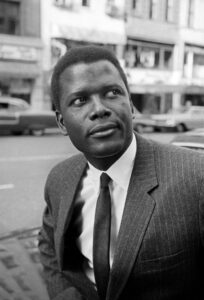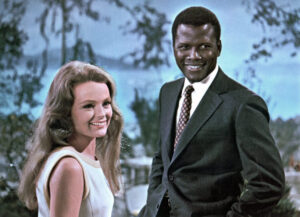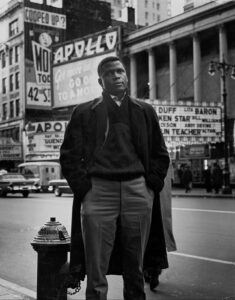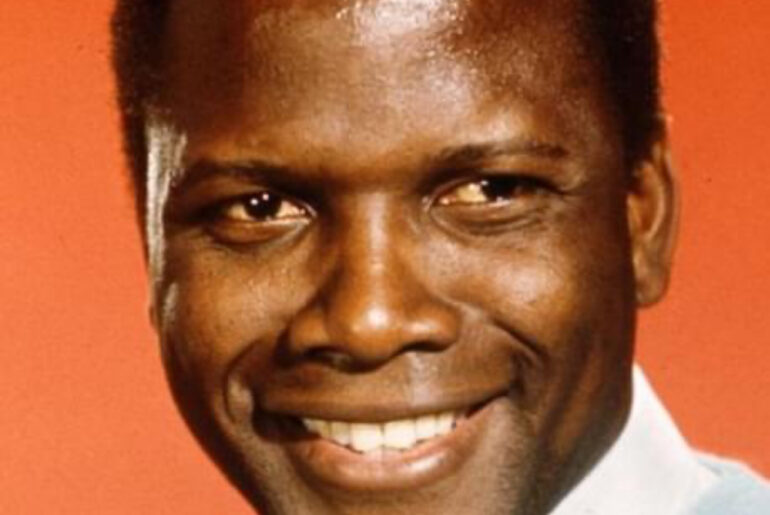The year we lost Sidney Poitier, the world said goodbye to a true icon of the silver screen. The epitome of grace and resilience, Sidney Poitier, at 96, has left an indelible mark on Hollywood and a legacy that transcends generations. While we mourn his passing, we also celebrate the extraordinary journey of his life, a journey that bridged chasms and broke boundaries in the film industry.
Born on February 20, 1927 in Miami, Florida to Bahamian parents, Sidney Poitier’s early life was marked by challenges that would discourage many. He grew up in the Bahamas and made the decision of a lifetime to move to New York at just 15 years old. It was a bold move that paved the way for his remarkable career in showbiz. Life in the bustling city was far from easy for the young Poitier as he found himself accepting various odd jobs just to make ends meet. He often spent his nights sleeping at bus stations, a testament to the determination and determination that defined his life.

But a chance audition at the American Negro Theater opened the path to fame he was destined for.
Poitier, the epitome of tenacity and tenacity, spent endless hours perfecting his American English despite being rejected at first because of his thick Bahamian accent. He eventually achieved success in the theater due to his unwavering pursuit of excellence.
His breakthrough role as a doctor treating a white bigot in 1950’s “No Way Out” marked his first major break in Hollywood.

His performance was praised and he began to receive recognition that signaled a breakthrough in a predominantly white business like Hollywood. In the 1950s, he played a number of notable roles that helped him gain notoriety. His rise to fame reached its zenith at the historic 1964 Academy Awards, when he became the first black actor to win the Academy Award for Best Actor for “Lilies of the Field.”
In receiving this award, he received more than just an individual award. At a time of intense racial tension and civil rights struggles in America, it symbolized a pivotal moment for Hollywood, representing a major step toward inclusivity and diversity.
His success served as a ray of hope for aspiring black actors, showing them that success was possible regardless of skin tone.

Sidney Poitier played revolutionary roles because of the kinds of characters he portrayed, not just because he was a black man in a prominent position. His performances regularly exuded decency, intelligence and integrity, challenging and shattering negative stereotypes of black men in Hollywood that had long prevailed.
He portrayed a successful doctor in “Guess Who’s Coming to Dinner” (1967) and a kindly teacher in “Lord, with Love” (1967).
These depictions played a significant role in changing American society’s image of black men. They provided welcome representation of blacks on screen by painting a picture of a reality that contradicted pre-existing prejudices.

He didn’t just portray characters; brought to life stories of resilience, humanity and dignity that have touched millions of people, regardless of race or background, around the world.
Besides being a good actor, Poitier was also a talented director. His first film “Buck and the Preacher” (1972) showed his talent for creating compelling stories for the screen.
In the following years, he directed a number of popular films such as “Uptown Saturday Night” (1974) and “Let’s Do It Again” (1975), proving his flexibility in the entertainment industry.
In addition to his career achievements, Poitier was a model citizen. His morals and ethics were evident in his work and personal life. He fought tirelessly for civil rights and was a key figure in the fight for racial equality.
Despite encountering racism and prejudice, he remained steadfast in his convictions and used his platform to speak out against injustice and instigate change.
In the following years, he directed a number of popular films, including “Uptown Saturday Night” (1974) and “Let’s Do It Again” (1975), proving his adaptability in the entertainment industry.

Along with his professional achievements, Poitier also lived the life of a model. His principles and ethics were clearly visible in his professional and personal life. He was a leader in the fight for racial equality and fought steadfastly for civil rights.
He faced racism and prejudice, but he did not let it control him. Instead, he used his platform to speak out against injustice and bring about change.
Sidney Poitier’s passing marks the end of an era, but it is not the end of his legacy. His life story, his iconic roles, his advocacy and his profound influence will forever be etched in the annals of Hollywood history. Sidney Poitier has left us with a lasting legacy in his remarkable journey – a legacy that continues to inspire and illuminate the world.
Poitier’s light may have died, but the brilliance he embodied will continue to shine in the hearts of millions, in Hollywood and beyond. His impact on the film industry, his portrayal of groundbreaking characters and his unwavering commitment to justice will remain a source of inspiration for generations to come. In an industry often fraught with racial tension and prejudice, Sidney Poitier stood as a beacon of hope and possibility.
When we remember and honor Sidney Poitier, we celebrate not only the man, but also the ideals he represented: dignity, talent and humanity. His life and work are a reminder of the transformative power of art, the importance of breaking down barriers, and the lasting legacy of those who dare to dream and challenge the status quo.
In a world that continues to grapple with issues of race and equality, Sidney Poitier’s legacy reminds us that progress is possible, that change can be achieved, and that the power of an individual’s voice and actions can shape the course of history. Sidney Poitier will forever remain a symbol of courage, resilience and the constant pursuit of a more just and inclusive world.




